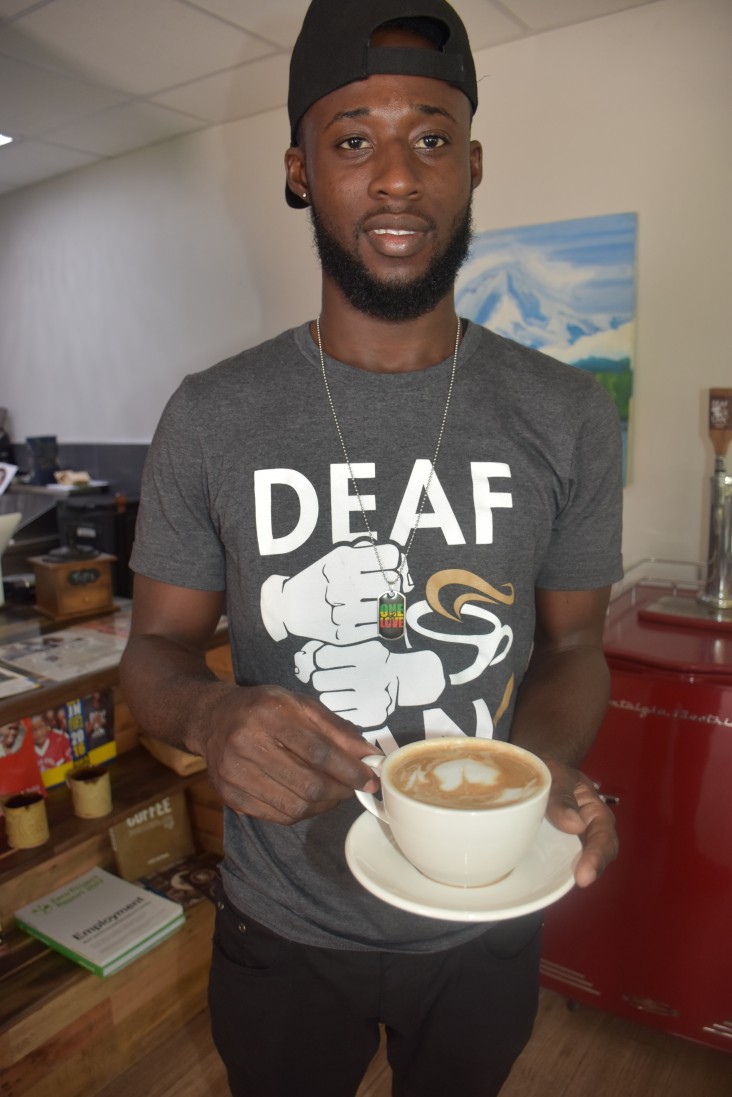
September 2017—Tucked away at the back of the Caribbean Christian Center for the Deaf in Kingston, Jamaica, sits the quaint E3 Café, home of Deaf Can! Coffee. With a megawatt smile and warm welcome, 21-year-old Fabian Jackson eagerly greets his customers and directs them to a board with instructions on how to order coffee.
Why instructions? Because Deaf Can! Coffee is a small social enterprise that employs people from the deaf community.
“I wasn’t born deaf,” explains Jackson. “I contracted meningitis when I was about 3 or 4 and I became deaf after.”
Jackson grew up among other deaf youth for most of his childhood, but faced barriers and discrimination when he entered the working world. “I always felt isolated because hearing people would do things together, talk together, and I was always left alone, always felt ignored, and had no sense of belonging.”
In 2015, Jackson’s life took a change for the better when a friend invited him to be part of Deaf Can! Coffee. He remembers being skeptical about joining the business, but says he soon felt at home among peers who spoke his language—sign language. He was trained as a barista and eventually worked his way up to his current position managing four full-time and 25 part-time staff members, most of whom are deaf.
Like many other social enterprises, Deaf Can! Coffee struggled to make a profit when it was established in 2015. Many social enterprises identify as not-for-profits with little motivation to grow, and the sector lacks structure, leadership and a data repository.
USAID is helping to change the dynamics. In 2012, USAID, in partnership with the JN Foundation, introduced the Social Enterprise Boost Initiative project, which helps to create an enabling business environment for social enterprises in Jamaica and helps them to transition their grant-funded operations into viable, profit-making businesses that can support their social missions.
In early 2016, Deaf Can! Coffee teamed up with the project and participated in extensive business and marketing training sessions, which allowed them to develop a business and financial plan. Ongoing one-on-one business consultations helped the enterprise to start generating more revenue.
Deaf Can! Coffee now boasts a diverse and growing customer base, primarily reached through mobile events where the team can set up shop and interact with the hearing community. Before working with the project, Deaf Can! Coffee would attend two public events per month on average. Thanks to networking through the partnership, the team now participates in at least 12 events per month. The group has seen a 400 percent increase in revenues so far this year, thanks to the knowledge gained.
Now thriving, the company is looking to the future. First step: branding the company’s mobile bus. This will help to spread the message that the deaf community can provide opportunities and live meaningful and productive lives.
Jackson is determined to make a difference. “Through Deaf Can! Coffee, we are doing a lot of training in deaf advocacy, for the deaf community to get more equal access to things, because there are so many barriers and levels of discrimination that we as a community face,” he says. “We want to change that and use Deaf Can! Coffee as a platform so that our community has the same access to that of the hearing community.”
The USAID-supported Social Enterprise Boost Initiative project works with entrepreneurs and small businesses to build prosperity and offer employment to youth and vulnerable populations at risk for poverty, crime, violence and migration. The project, launched in 2012 and running through 2018, currently supports at least 20 social enterprises.
LINKS
Follow @USAIDJamaica, @USEmbassyJA, on Facebook, on YouTube







Comment
Make a general inquiry or suggest an improvement.